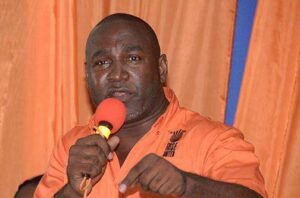
Clarke supports recruiting of athletes
THE recruiting, or “buying”, of athletes by the top schools for sporting success has received its fair share of criticism over the years.
But Michael Clarke, a 10-time winning coach of the popular Inter-Secondary Schools Sports Association (ISSA) Boys Championship, views it as a stepping stone for better things for the student beneficiaries.
The sceptics would play down a school’s achievements if its success came through students who did not originally pass the Grade Six Achievement Test (GSAT) but gained entry into the institution by way of sporting ability.
“I don’t see anything wrong with it. Yale University buys our kids of academic talent. Why when sporting talent is being bought must it be seen as a bad thing?” Clarke asked during the Observer’s Monday Exchange meeting recently.
Clarke, who led St Jago, Jamaica College and Calabar High to 10 championships honours, says he finds that the best sportspersons are coming from the lower socio-economic stratum of society.
“Just imagine someone, say, from Tivoli, for example, he is the only person out of a family of, say, 10 or 12 who would have had any opportunity to be exposed to the other side of the fence because he has a God-given talent. Are we saying that it not ought to be so?” Clarke reasoned.
“Or if he had a God-given talent and brilliant in Maths and is attracted to Harvard or UWI, I totally support it,” said Clarke.
“I see Champs as contributing towards national development. It provides significant achievements. It provides the opportunity to see the other side of the fence for scholastic purposes. If two persons are saved, it is two less persons on the road trying to dig down your door,” said Clarke.
“It is a step in the right direction. When you look at the society in terms of unemployment and drugs and guns, I feel very proud when I can prevent a boy from hanging out on the corner.
“A lot of these dons end up being the father, end up being the mentor because there is no father,” he noted.
Clarke said during his 30 years of coaching it is astonishing the number of fathers he has met during that period.
“If there had been a time when I meet five male parents out of that team, I would have met enough.
“This is my calling… because I’ve seen where boys are helped and shaped by coaches. Some of these boys have no fathers. I spend an average of $4,000 to $5,000 a week on bus fares and lunch monies, shoes, exam fees or books,” he said.
Clarke, whose son, Sekou, represented JC with success, was recruited by the University of Florida, but Clarke said he had to spend more than he had bargained for to keep him in college.
If he wasn’t in a financial position to assist his son, he would have fallen along the wayside, just like many others before him who disappeared off the radar after gaining a scholarship overseas.
“Some of these students drop out. This is part of the reason we don’t see some of our stalwarts that we brought through because the support is just not there,” he emphasised.























